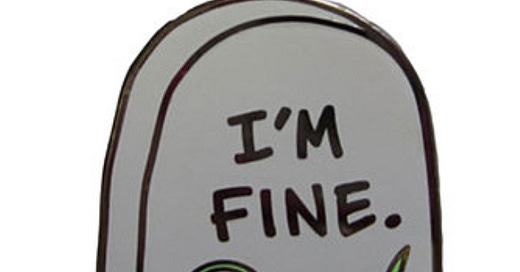the art of explicitness + the awkwardness, too
GREEN CHILI AND GARLIC AND GINGER, AND SCENE —
there’s an art to the word “just.” it softens the blow almost as much as an exclamation point lightens the request. sweep it into an e-mail, under the rug of a potentially-tense conversation, and button everything up before someone gets offended (or worse, feels like you’re being passive aggressive).
for example, this is an e-mail i sent recently: i’m just checking on the status of my request! no worries if you have no update, i’ll bug you soon to check again!
i, like many other women in tech and in life, have the tendency to internalize the Play Nice Cheatsheet and make it part of daily discourse. add smiley faces, unnecessary apologies, and doubly unnecessary explanations, and you have yourself a playbook to whip out on demand. given the fact that i’m a professional writer, my playbook is stacked with synonyms galore.
while soft e-mails here and there seem harmless, lately my sugarcoating is making its way into higher stakes conversations.
more later, including the art and awkward of explicitness, but first my words + reads:
my words: to work toward its goal of investing in 1,000 diverse founders over the next 20 years, harlem capital has closed a $40 million debut fund.
learning lesson: every time i ask an investor who is actually investing in sourcing underrepresented founders how they do it, i get the same answer: explicitness (do i get points for both my work and personal ramblings having the same theme?). anyways, when it comes to diversity for them, there is no fancy tool, or funnel system, or software thingamajig. it’s in their investment thesis, or broadly on their website. for example, charles hudson of precursor pointed to his team’s diversity as enough of a pull to get diverse founders to apply themselves.
etc: at one point in the interview, i asked harlem capital’s co-founders how they view other diversity-focused funds. one founder, politely, told me this question wouldn’t really be asked if it was a software-focused fund. if there’s room for 392 future of work funds, there’s room (and demand) for triply more diversity-focused funds.
unorganized tab time:
couched-based dtc for brides
anyways,
sure, i could spell check my e-mails and slack messages to take out extra flowery language, but that all feels too small and surface level. so let’s try to scratch the harder, more engrained side of being an indirect person.
i’ll start with a simple cause and effect perspective: if i’m indirect, i don’t end up with what i want, and often times, what i deserve. i need to ask for someone to show up for them to show up. i need to hold someone to a higher standard for them to change. i need to raise my hand to be called on. i need to recognize and articulate my own flaws before i can even attempt to change them.
and i’ll tack on a simple game plan: i’m saying more of what’s on my mind until i get to a point where i realize that it isn’t a scary thing. no one is flipping over a table because i asked for them to confirm whether or not they can grab coffee. and no one is setting the room on fire because i cancelled plans to stay in bed.
often, being direct is not about ripping off the bandaid, it’s about changing an internalized habit to see everything as a big wound in the first place. as someone who is empathetic to a point of weakness, i am doing my best to join the latter camp.
to wrap this all up with a contradiction, i think if we all buckle down on being thoughtful about our interactions, then starting with using less exclamation points isn’t too small of a start. because heck, even if it starts in our inboxes, at least it’s a start.
to not sending anymore “i’m fine” texts in 2020,
n



